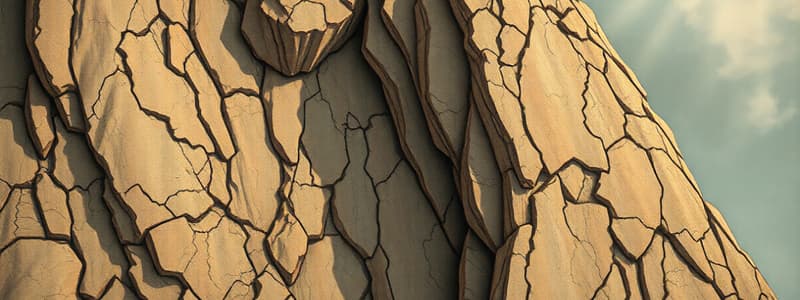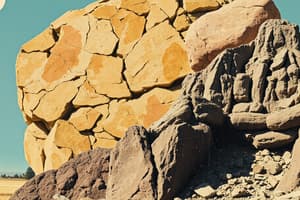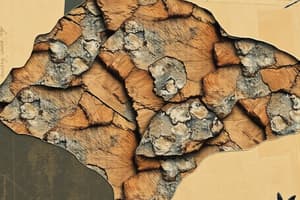Podcast
Questions and Answers
What type of weathering is primarily caused by living organisms?
What type of weathering is primarily caused by living organisms?
- Mechanical Weathering
- Biological Weathering (correct)
- Chemical Weathering
- Physical Weathering
Which of the following rocks is likely to weather the slowest?
Which of the following rocks is likely to weather the slowest?
- Marble
- Limestone
- Sandstone
- Igneous rock (correct)
What is the result when air pollutants like nitrogen oxide and sulfur dioxide combine with sunlight and moisture?
What is the result when air pollutants like nitrogen oxide and sulfur dioxide combine with sunlight and moisture?
- Ozone depletion
- Fossil fuel emissions
- Acid rain (correct)
- Dust storms
What are rocks primarily composed of?
What are rocks primarily composed of?
What type of stress is described as pulling rock apart or stretching it?
What type of stress is described as pulling rock apart or stretching it?
How does climate influence the rate of weathering?
How does climate influence the rate of weathering?
Which type of deformation returns to its original shape after the stress is removed?
Which type of deformation returns to its original shape after the stress is removed?
Which of the following statements about acid rain is true?
Which of the following statements about acid rain is true?
What is erosion in relation to weathering?
What is erosion in relation to weathering?
Which type of stress occurs at convergent plate boundaries?
Which type of stress occurs at convergent plate boundaries?
What process is responsible for the disintegration of rocks due to human activities?
What process is responsible for the disintegration of rocks due to human activities?
What happens to rocks under shear stress?
What happens to rocks under shear stress?
Which statement is true regarding ductile deformation?
Which statement is true regarding ductile deformation?
Which combination of factors can speed up weathering?
Which combination of factors can speed up weathering?
How did tension stress contribute to the formation of continents?
How did tension stress contribute to the formation of continents?
Which of the following is NOT a process that changes rocks?
Which of the following is NOT a process that changes rocks?
What role does weathering play in the formation of geologic features?
What role does weathering play in the formation of geologic features?
How do rocks react under compression stress?
How do rocks react under compression stress?
What is one primary cause of metamorphism in rocks?
What is one primary cause of metamorphism in rocks?
Which of the following statements is true regarding the weathering process?
Which of the following statements is true regarding the weathering process?
What is the expected outcome when rocks undergo shearing stress?
What is the expected outcome when rocks undergo shearing stress?
What impact does human activity have on rock preservation?
What impact does human activity have on rock preservation?
Which type of stress specifically involves pulling apart rocks?
Which type of stress specifically involves pulling apart rocks?
What happens to the mineral composition of rocks during metamorphism?
What happens to the mineral composition of rocks during metamorphism?
Which metamorphic rock represents the highest grade among the rocks listed?
Which metamorphic rock represents the highest grade among the rocks listed?
What is the primary factor that causes the increase in metamorphic grade?
What is the primary factor that causes the increase in metamorphic grade?
How do the characteristics of rocks change as their metamorphic grade increases?
How do the characteristics of rocks change as their metamorphic grade increases?
Which of the following rocks is the least metamorphosed?
Which of the following rocks is the least metamorphosed?
What role does pressure play in the formation of metamorphic rocks?
What role does pressure play in the formation of metamorphic rocks?
Which feature is most likely to be associated with schist compared to slate?
Which feature is most likely to be associated with schist compared to slate?
In increasing order of metamorphic grade, which sequence is correct?
In increasing order of metamorphic grade, which sequence is correct?
What distinguishes gneiss from other metamorphic rocks?
What distinguishes gneiss from other metamorphic rocks?
What are the primary agents of weathering that affect the landscape?
What are the primary agents of weathering that affect the landscape?
Which geologic processes are responsible for the continuous alteration in the earth's form and shape?
Which geologic processes are responsible for the continuous alteration in the earth's form and shape?
What is the primary focus of the disclaimer provided in the content?
What is the primary focus of the disclaimer provided in the content?
Which quality assurance team includes both Joan Y. Bubuli and Lielin A. De La Zerna?
Which quality assurance team includes both Joan Y. Bubuli and Lielin A. De La Zerna?
What are the qualifications of Maria Amelia Lasmarias as per the content?
What are the qualifications of Maria Amelia Lasmarias as per the content?
In what capacity is Maria Amelia Lasmarias currently involved in education?
In what capacity is Maria Amelia Lasmarias currently involved in education?
What does the process of weathering primarily lead to in an ecosystem?
What does the process of weathering primarily lead to in an ecosystem?
What is the role of the members listed in the quality assurance teams?
What is the role of the members listed in the quality assurance teams?
Flashcards are hidden until you start studying
Study Notes
Weathering
- Weathering is the breaking down of rocks and minerals on the Earth's surface.
- Weathering agents include water, ice, acids, plants, animals and changes in temperature.
- Weathering can be destructive and leads to significant changes in the landscape and ecosystems
- Human activities can speed up weathering.
- Certain air pollutants like nitrogen oxide and sulfur dioxide can cause acid rain, which accelerates weathering of rocks.
Deformation of Rocks
- Stress is the force applied to an object.
- In geology, stress is the force per unit area applied to a rock.
- When rocks deform, they are said to strain.
- Strain is a change in size, shape, or volume of a material.
Types of Stress
- Tensional Stress: Pulls rock apart or stretches it.
- Compressional Stress: Pushes or squeezes rocks together.
- Shear Stress: Causes two planes of material to slide past each other.
Stages of Deformation
- Elastic Deformation: Causes temporary strain that is reversed when the stress is removed.
- Ductile Deformation: Causes irreversible changes in shape or size, even after the stress is removed.
Metamorphism
- Metamorphism is the change in the mineral and textural composition of rocks due to changes in pressure and temperature.
- The higher the metamorphic grade, the more significant the change in the rock from its original form.
Studying That Suits You
Use AI to generate personalized quizzes and flashcards to suit your learning preferences.




